Argentina 101: Rebuscársela
A survival skill, a national pastime, and a state of mind.
I’m not a good cook. If I were, things wouldn’t burn and stick to my supposedly non-stick pans as often as they do. Still, I resist following recipes. I don’t like timers or scales. I’m all over the place in the kitchen and sticking to a recipe feels boring. All the energy planning and preparing for what? A slightly better meal? Also, I’m not going to the supermarket for extra ingredients if I can recycle what’s in my fridge before it goes to waste. I prefer improvising and dealing with the consequences, which are rarely inedible because I know how to rebuscármela1.
Rebuscársela is one of my favorite words. All Argentinians are instinctively familiar with it but they rarely think about it. If a nationwide census asked which words represent us the best, not many people would mention rebuscársela. But everyone would agree it’s part of our identity. Football, asado and mate are the obvious words linked to Argentina. But they describe what we eat, drink or play, not who we are. Passion would be a gigantic word if we generated an Argentinian word cloud. We are passionate about everything, especially about rebuscársela.
Rebuscársela is a mindset. It belongs to me, my family, and the forty-six million Argentinians who improvise not only in the kitchen but in life. It’s our default response to anything. That’s how we solve problems and turn boredom into fun. Like cutting a large plastic Coca-Cola bottle in half with a serrated knife, melting the sharp edges with a lighter to make an improvised communal-chalice for drinking Fernet Branca among friends. We could use plastic cups, but what’s the fun in that?
Born in an unpredictable environment
My Dutch girlfriend, Simone, smiles while she watches me cooking. That smirk on her face is a combination of approval and pride. It shows up every time I act confidently, her way of saying to the world: “Yep, that’s my man”. Simone watches me rebuscármela half-entertained, definitely curious but also a bit horrified. She prefers not to be part of it.
Simone doesn’t see the fun in not following a plan. It’s more the other way around. Instructions allow her to relax, and that is what makes cooking fun. For the Dutch, precision and predictability are traits of the highest regard. Like improvising is some sort of tragedy the unprepared must suffer.
Simone loved how tonight’s pollo alla randomness turned out, but she surely doesn’t like my lack of answers to her questions. She asks for the recipe and gets frustrated upon the absence of quantitative details and exact measures. How long I simmered the sauce or how many cloves of garlic I used are mysteries that belong to the universe. I’m okay with not knowing. I can’t repeat tonight’s dinner tomorrow, just as no man steps into the same river twice.
Simone and I are very different in this department. She always keeps two of everything nonperishable in our pantry so we never have to improvise: two salts, two boxes of bouillon cubes, two jars of dried oregano. Her idea is that if we run out, we didn’t really run out. Always a spare, a reserve, a backup plan. That’s the opposite of me. I see no big deal if we run out of eggs for breakfast. I also like yogurt. No yogurt? A banana or a good old fast. The scenarios we avoid are rarely as bad as we think.
After living in The Netherlands for a couple of years, I’m convinced that the Dutch see improvising as a tragedy that can and must be avoided at all costs through diligent planning. As if it’s an evolutionary thing: the Dutch who took it easy and went with the flow most probably drowned during a flood2. And the ones who survived were the ones who never waited to start building dams and dikes. Thanks to that, they now live here. And because of that, I can also live here without having to rebuscármela too much.
Moving from Argentina to the Netherlands felt like lowering the difficulty level of the video game called life: from nightmare to walk in the park. Simone, like her fellow Dutchmen, doesn’t truly get what I mean when I say Argentina is chaotic. But I also can’t blame them for that. Why should they know?
Even if they decided to live in Argentina, they still wouldn’t grasp what it’s like for us to live there. They would get to meet rebuscársela in the flesh but it wouldn’t become a part of their identity. The reason behind that is that the moment they feel tired of Argentina’s safari-like adventure, safety and stability are still waiting for them where they left them, between Germany and Belgium. Therefore, rebuscársela is for them just another curiosity that doesn’t fit inside a Lonely Planet guide. But for us, it’s much more than that.
A regular day in the life of an Argentinian
Rebuscársela is a skill that isn’t taught in classrooms. It’s something we acquire through an infinity of micro (and not so micro) stressful situations only familiar to Argentinians. In Argentina, there’s always a side portion of stress with everything you do. Simple things like taking the train are never as simple as they seem. To understand what I mean, let me unpack the mind of an archetypical porteño3 as they go through a regular day in their life:
You wake up early and take the dog out for a walk. You constantly look over your shoulder because the streets of Buenos Aires aren’t that safe to walk outside without concerns. You rush but not because you’re in a hurry per se, but because every extra minute on the street feels like tempting fate. You fear a scooter could come out of nowhere and rob you. Or kill you. Even without you trying to resist.
Back home, you check the news to see how the country decided to wake up: which roads are closed due to protests, which bus lines are on strike, which trains aren’t running. This also keeps you updated about the latest corruption scandals, economic crisis and such.
At the train station, you wait on the platform but the train seems to be late. It should have arrived ten minutes ago, and you wonder how long this situation is going to last. After anxiously waiting for a miracle, you find out the train is cancelled. You must rush to get a spot on a bus. You are relieved to fit inside, even though squeezed like a sardine in a tin.
At work, you ask your boss for a raise to keep up with hyper-inflation. Their answer might be the only thing that doesn’t surprise you today. Your boss explains that the company is barely surviving, sales are slow and suppliers are delaying payments. That they’ll do what they can. You receive this understandable but disappointing answer every two or three months, like all other Argentinians.
On your way back home, you find your neighbors gathered on the street with arms crossed and serious faces. They tell you another power outage is going on. They’ve called the power company and the complaint was registered. They said they would send a technician as soon as they can. You have no idea how long it will last. Again, there’s nothing you can do but to wait.
Later in the evening, you can’t fall asleep because without electricity there is no AC or fan. Your body sticks to the bedsheets and opening the window is trading heat for the buzz and bites of mosquitoes. No power also means no fridge. You hope it comes back before food starts to go bad.
Welcome to a regular week in the life of many Argentinians. This might sound like a horror tale but all these things can actually happen on the same day if you are unfortunate enough.
The Two Sides of Rebuscársela
Most of the time, there is nothing you can do but to wait for an “official solution” to arrive. There is however a feeling that the power company, or any other company, doesn’t really care about the quality of their service, you or the havoc they wreak on your life. That if you want a solution, you need to find it yourself. But you aren’t qualified or responsible or authorized to solve the problem. So, what can you do besides: rebuscársela.
Rebuscársela comes in two forms: MacGyver-science and “Lo atamo’ con alambre”.
MacGyver-science solutions are the ones that make us feel proud of being Argentinian. For example: during the Malvinas War, Argentinian engineers repurposed pasta machines to make “chaff” by slicing thin strips of aluminum foil. “Chaff” is tiny reflective material ejected from aircrafts to confuse enemy missiles. Released into the air, the decoys create false radar targets, saving both plane and pilot. Producing chaff requires specialized equipment, which of course we didn’t have. But we’re Argentinians and we always find a way.
No fancy machinery, no resources, just our knack for rebuscársela. Our chest pumps when we find a solution where others can’t. So when Argentina, despite all the difficulties, designs, builds and launches a satellite, it’s a big deal for us.
But rebuscársela also has a not so pretty side. “Lo atamo’ con alambre” is a common Argentinian idiom you hear on a daily basis. It literally means to tie things together with baling wire. Like MacGyvering, it also involves finding a solution to a problem with limited resources. But it’s much more redneck engineering than science.
A “Lo atamo’ con alambre” solution won’t be pretty but it’ll do the job. Probably. Hopefully. At least for a while. But it’s definitely not going to look good, like a plastic bag duct-taped over a broken window. “Lo atamo’ con alambre” is something so Argentinian that our songwriter Ignacio Coppani wrote a song about it in 1988. The song hasn’t aged at all, because everything is still the same as it was before.
After forty years of tying everything together with baling wire, we stopped seeing these solutions as exceptions as they became the norm. We accepted them as an inexorable part of living in Argentina. And as a consequence, our quality bar and tolerance for how things should work have plummeted to a point that it became dangerous.
The Hazards of Rebuscársela
It turns out many things can “just work” at the expense of safety. Tying things with baling wire isn’t only visibly ugly but also invisibly unsafe. People rely on modifying and adapting whatever old parts they can get their hands on. Don’t forget that everyone around you, like the train mechanic, also lives in Argentina and is figuring things out. Or do you think mechanics work exclusively with brand-new imported parts from official suppliers that meet ISO standards?
But baling wire inevitably breaks and tragedies happen. A train crash, a plane that never takes off, and a sunken submarine are dark events of our history surrounded by negligence and the mystery of who is actually responsible. No one knows exactly what happened or who’s to blame. Investigations rarely bring justice. “Human error” and corruption always get the blame but everybody is responsible because we all partake in this phenomenon.
It’s a kind of miracle we don’t have more of these tragedies in Argentina. Deep down, we know they could happen at any minute but we feel there is nothing we can do about them. So, with resignation, we have accepted them.
We do have safety rules in place, but they aren’t adapted to our current reality. They represent what we ought to do, but not what we can realistically do. We copy-paste rule books from Europe and U.S., but we are not them. Especially economically speaking.
Enforcing safety measures by the book would require the entire country to be shut down, but that isn’t possible. Trains need to keep running and people need to keep showing up for work. So, upon this impossible situation we decided to just ignore rules altogether. Which is another type of tragedy.
Humor is our solution for when there is no solution
But one can only experience so much tragedy. Sometimes you need joy even if that involves laughing at tragedy.
We say “reírse para no llorar”: to laugh to keep from crying. That’s the only thing we can do about the problems that can’t be solved: sickness, death, or —according to Argentina’s economic history— inflation.
Our out-of-the-box creativity is also channeled towards making humor. Rebuscársela is, after all, finding solutions even for situations that have none. Argentinians are the self-claimed world-champions of meme-making. The moment something happens, good or bad, everyone’s already waiting for “the memes” to arrive.
Maybe in a stable country, with clear rules, access to credit, and strong institutions, we would pour our energy and creativity into becoming entrepreneurs or inventors. But because we have none of those and laughter is free, we pour our passion into the meme-economy, so both the rich and the poor can share a laugh.
I remember my surprise in 2022, already living in The Netherlands, when the Dutch cabinet collapsed. My biggest memory was the lack of memes. I couldn’t believe it. How could that be? Where were the memes? The Dutch went on with their lives as if nothing had happened... because for them, nothing really had. As it probably should.
I wonder if that’s the reason why Europeans have that image of life in South America being happy and carefree. They always see us joking and laughing, even with all the problems that we have. As if we have the secret for a happy life they are missing. But I don’t think they see how much of that laugh is just coping. And there is no market for exporting memes in exchange for trains that run on time. Or just run. We would if we could. Who wouldn’t?
An Argentinian Identity Without Crisis
To this date, I’ve lived in The Netherlands for almost eight years. My relationship with Simone, her family, her language, her culture, they all shaped me. I’m eight years less Argentinian than if I had stayed there. Living on the other side of the Atlantic, I get to see Argentina from a distance. I appreciate the best parts without the anger and frustration that comes from the close contact with an environment where nothing just works.
I’m convinced we are, by large, a product of that environment. An Argentinian is not only someone born in Argentina but someone shaped by Argentina. Every generation, grandpas, parents and children, get the same test with slightly different names and numbers, but always the same answer: rebuscársela.
To tie things with baling wire. To hack, to patch, to make a parachute out of a plastic bag. This seemingly eternal Groundhog-Day situation convinced me that rebuscársela is a fundamental part of being Argentinian. That an Argentinian without this trait would somehow be incomplete.
“What doesn’t kill me makes me stronger,” Nietzsche said. In Argentina’s case, I’d say it makes us stronger together. Every trauma tightens the fabric of our society a little more, drawing the fibers closer until they form something like a bulletproof Kevlar vest. We as a society became harder than the meat they eat in Europe4.
At the same time, hard times also softened us towards each other.
A special sense of togetherness is created by relying on people when systems fail. Like we have developed an instinct to look after each other because no institution ever will. Your people are your safety net.
During blackouts, it isn’t rare that a lucky neighbor who still has power plugs an extension cord to his house and shares his luck and electricity with you. When public transport fails to show up, a stranger offers to share a cab with you and even covers your share of the ride. Someone invites you to spend Christmas with them if you have no family of your own or no one else around.
The bonds in Argentina mean something else. Not only with your family, but also with your friends and neighbors. These connections are a big reason why some people decide not to leave the country.
Times have been hard in Argentina for as long as I can remember. And my parents can remember. But what if they weren’t? In a hypothetical future where Argentina’s worst problems no longer exist, what would happen to our most beloved traits? The strength of our social bonds, the over the top jokes, and our knack for surprising even ourselves with clever solutions. We all want Argentina to be safer and less stressful. More normal would already be a lot. But maybe, deep down, we don’t want to lose the beautiful things these terrible situations create.
I would love it if we could bond as strongly as we do now but without needing each other so much. I hope we could keep our character without the crisis. I hope the neighbor who saves you from blackouts with an extension cord will, in a calmer country, still help others in a different way. The jokes would get less fatalistic but no less funny, and our creativity would be free to move from dangerous hacks to more top-notch inventions.
A better Argentina will still shape us but a bit differently. The challenge is to improve a whole country while still carrying forward the values that make us who we are. That, too, is being Argentinian. That too is rebuscársela.
The I- version of rebuscársela.
Literally going with the flow.
A resident of Buenos Aires.
Simone wasn’t a big fan of red meat before me because of “all the nerves that you have to chew a lot”. Now she knows better.


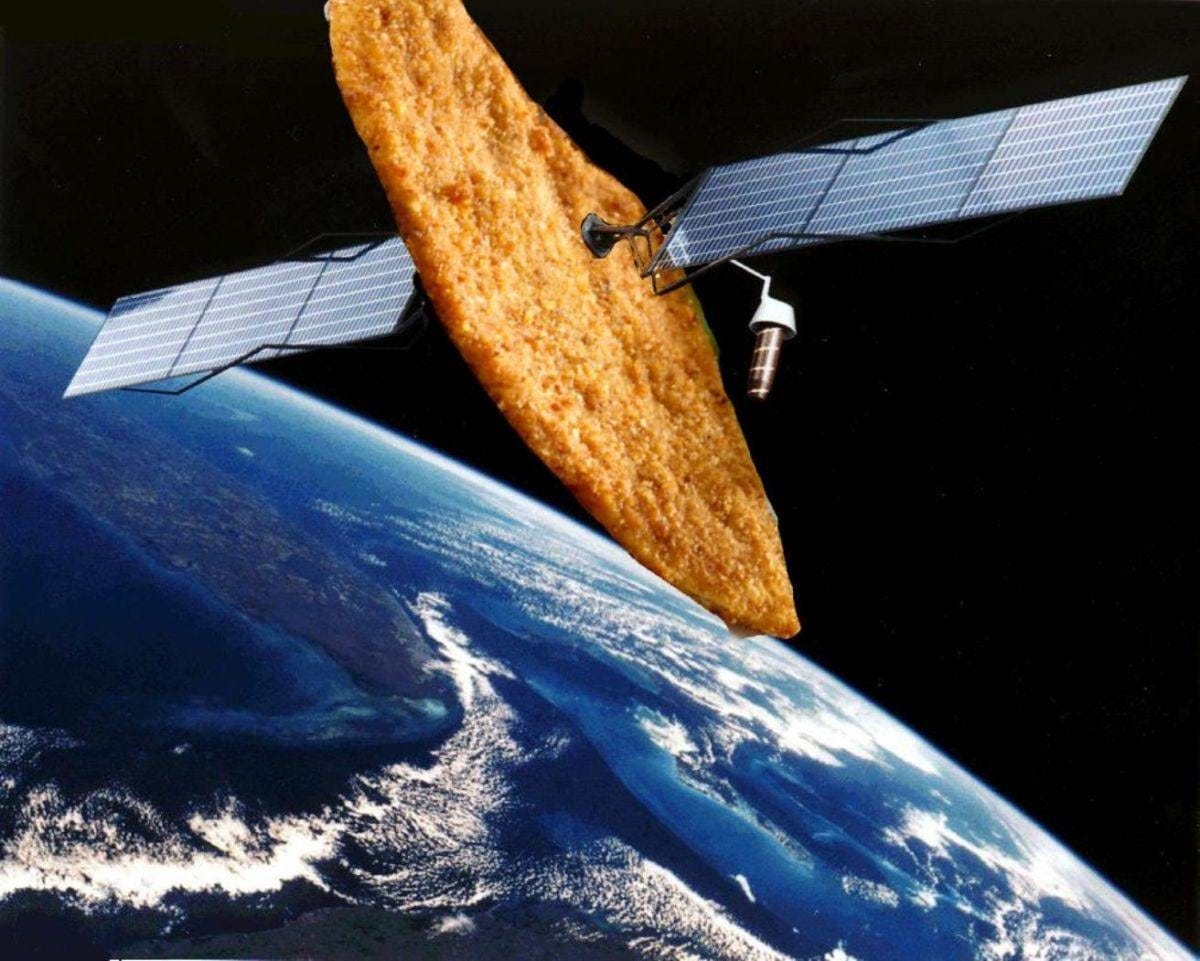
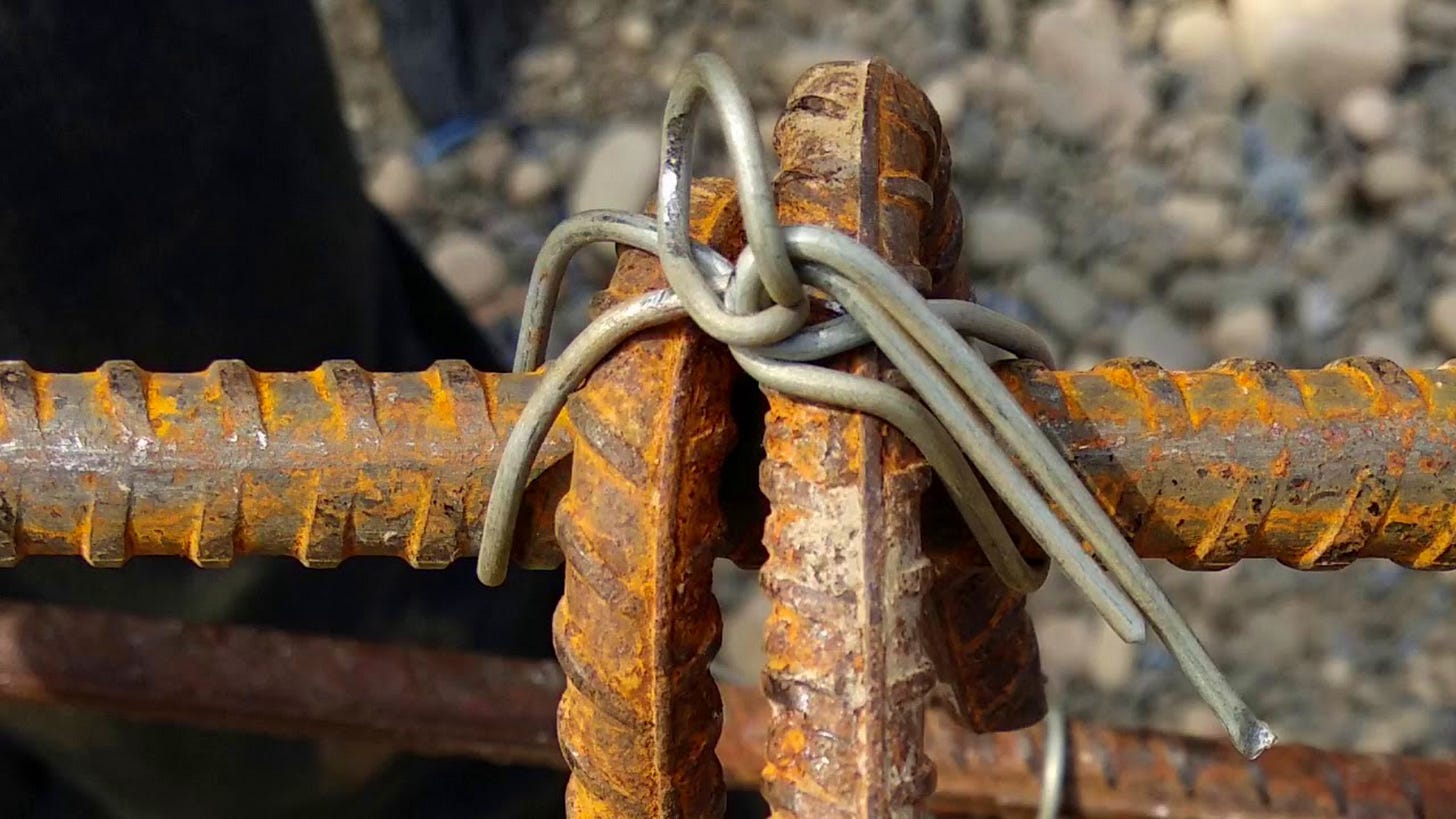
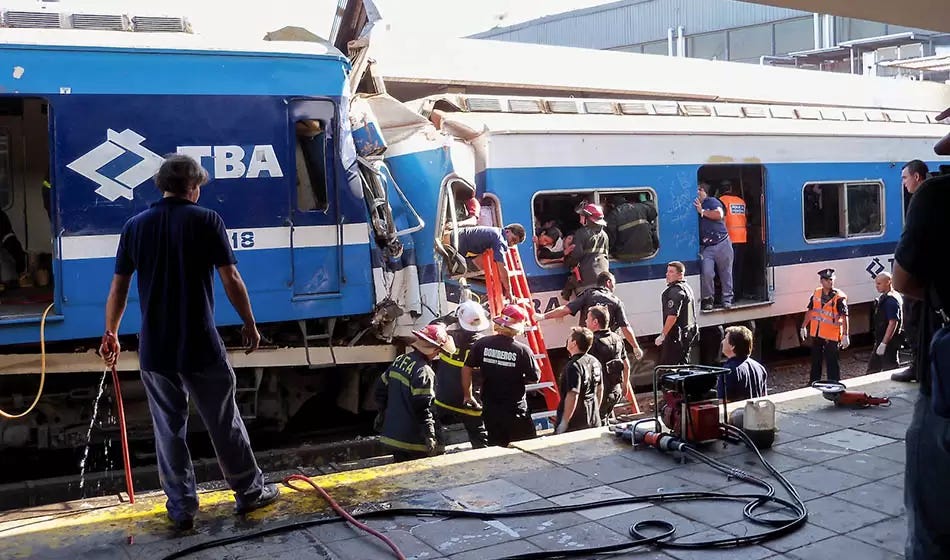
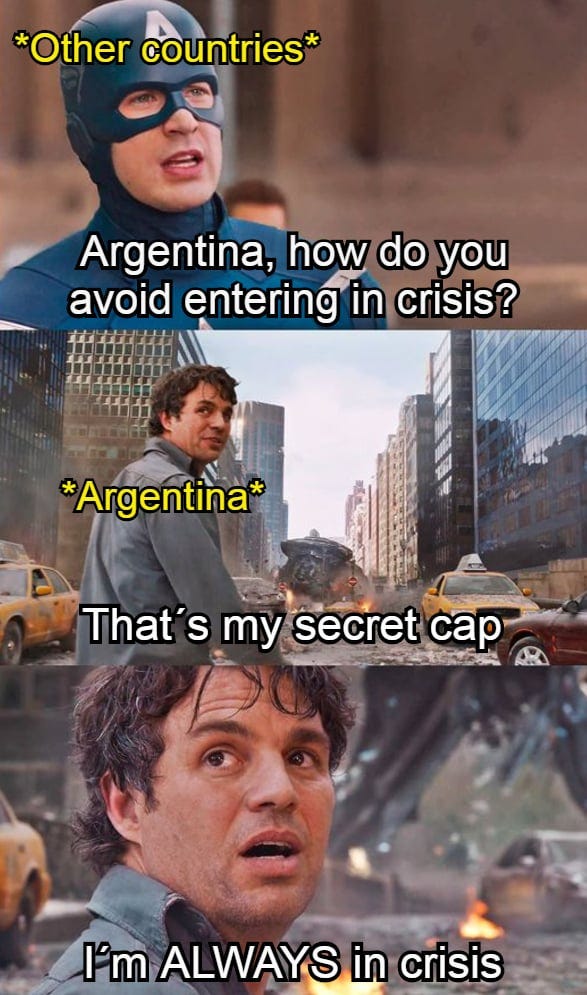
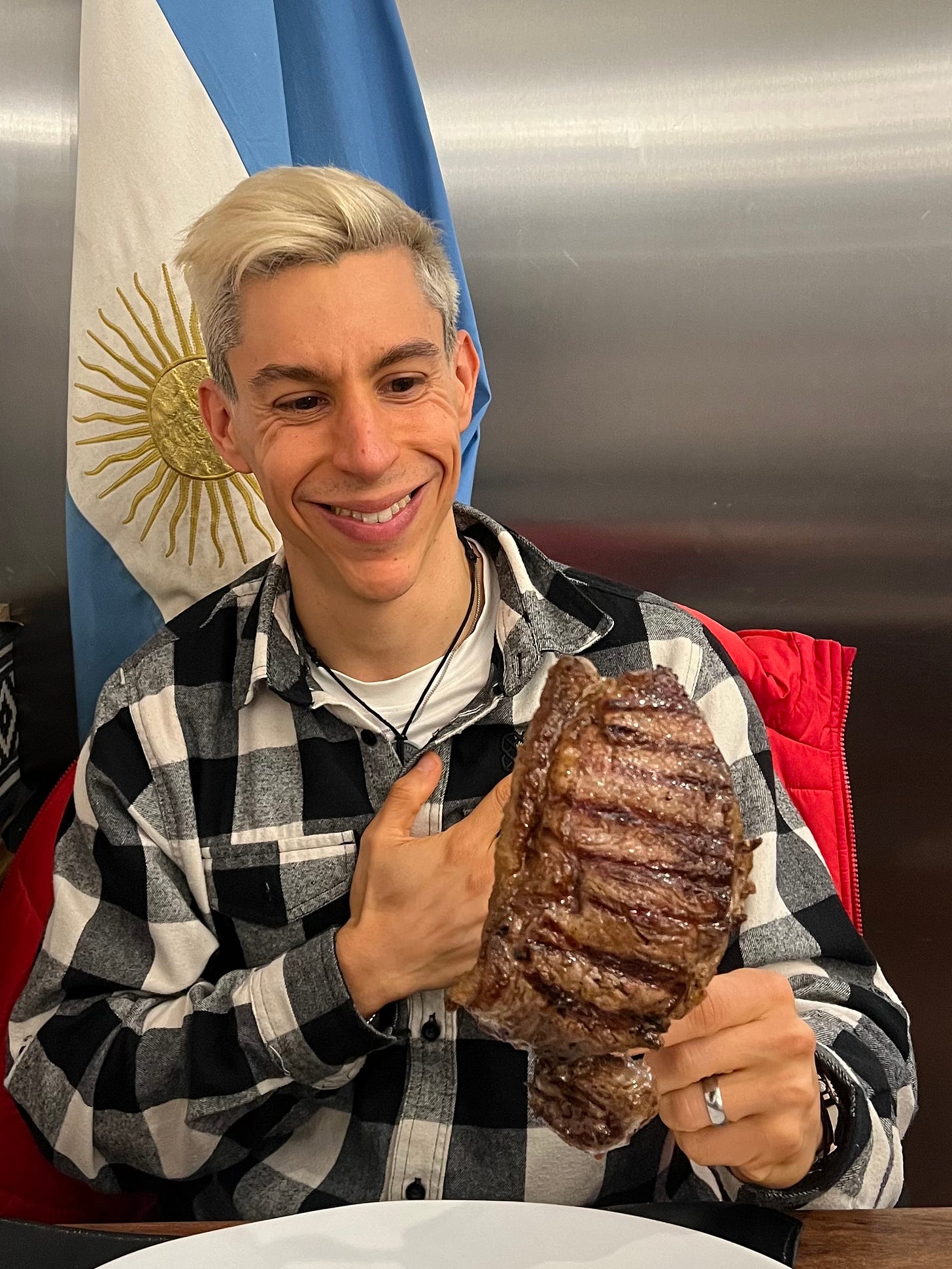
Love this!